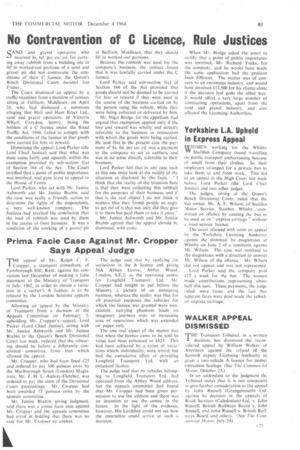No Contravention of C Licence, Rule Justices
Page 65

If you've noticed an error in this article please click here to report it so we can fix it.
RAND and gravel operators who Li received 8s. 6d. per Cu, yd. for carrying away rubbish from a building site to M worked-out portions of a sand and gravel pit did not contravene the conditions of their C licence, the Queen's Bench Divisional Court decided last Friday.
The Court dismissed an appeal by a traffic examiner from a decision of justices sitting at Feltham, Middlesex, on April 28, who had dismissed a summons alleging that Hall and Ham River Ltd., sand and gravel operators, of Victoria Wharf, Croydon, Surrey, being the holders of a C licence under the Road Traffic Act, 1960, failed to comply with the conditions of the licence in that goods were carried for hire or reward.
Dismissing the appeal, Lord Parker (the Lord Chief Justice) said that what was done came fairly and squarely within the exemption provided by sub-section 5(a) of Section 164 of the Act. The Court certified that a point of public importance was involved, and gave leave to appeal to the House of Lords.
Lord Parker. who sat with Mr. Justice Ashworth and Mr. Justice Brabin, said the case was really a -friendly action to determine the rights of the respondents, a very well-known company. The Justices had reached the conclusion that the load of rubbish was used by them in the course of their business. It was a condition of the working of a gravel pit
at Bedfont, Middlesex, that they should fill in worked-out portions.
Because the rubbish was used for the company's business, the justices found that it was lawfully carried under the C licence.
Lord Parker said sub-section 5(a) of Section 164 of the Act provided that goods should not be deemed to be carried for hire or reward if they were used in the course of the business carried on by the person using the vehicle, while they were being collected or delivered by him, Mr. Nigel Bridge, for the appellant, had argued that exemption applied only if the hire and reward was wholly and directly referable to the business in connection with which the goods were being carried. He said that in the present case the payment of 8s. 6d. per cu. yd. was a payment to the company to act as carriers, and was in no sense directly referable to their business.
Lord Parker felt that in any case such as this one must look at the reality of the situation as disclosed by the facts. " I think that the reality of the situation here is that they were collecting this rubbish for the purposes of their business, and if that is the real object 1 do not think it matters that they found people so eager to get rid of it that not only did they give it to them hut paid them to take it away.
Mr. Justice Ashworth and Mr. Justice Brabin agreed that the appeal should be dismissed, with costs. When Mr. Bridge asked the court to certify that a point of public importance was involved, Mr. Richard Yorke, for the company, said he would have made the same application had the position been different. The matter was of concern to an enormous industry, and would have involved £12,500 for his clients alone if the decision had gone the other way. It would affect a very large number of contracting operations, apart from the sand and gravel industry, and also affected the Licensing Authorities.
































































































































































































